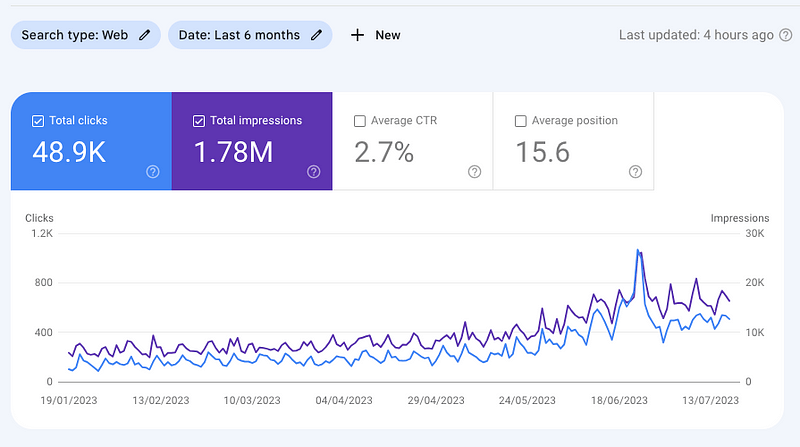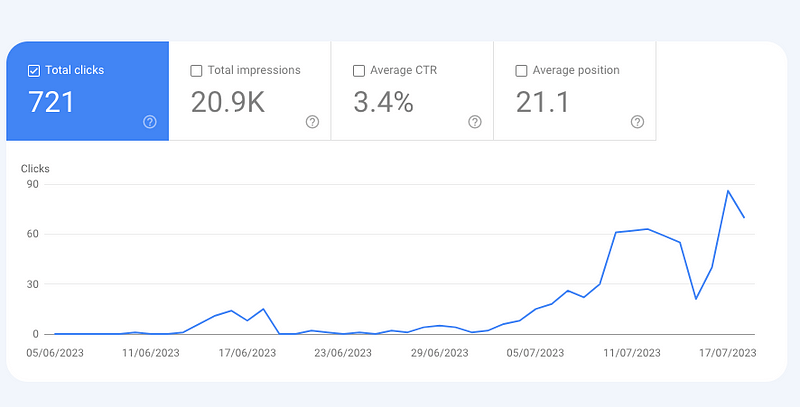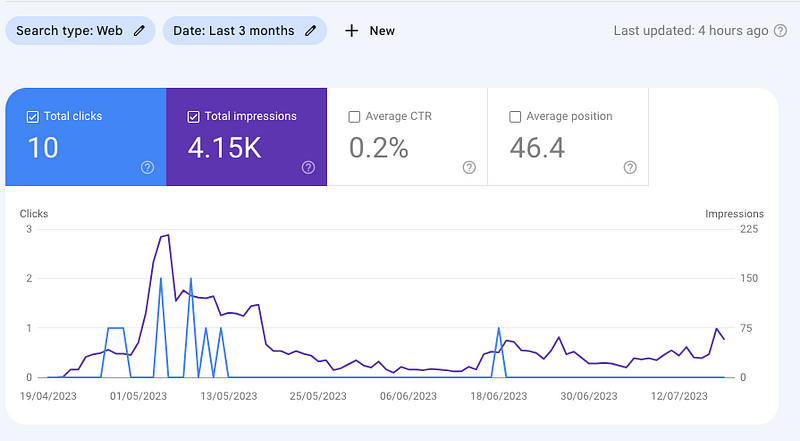Is there a limit on how many blog posts you can publish a day?
Does a successful blog need a consistent publishing schedule?
Let’s find it out by looking at actual data from my websites with dozens of daily posts and inconsistent schedules.
And if you’re just looking for a quick answer: No, there’s no limit to how many posts you can publish a day. Google won’t penalize active sites as long as the content quality is good.
Let’s jump in.
Site 1
I operate an accommodation niche blog with my friend.
We publish 5–10 blog posts on Wednesdays 2–3 times a month.
Seems like a horrible idea? No consistency and then one day 10 posts, right?
But take a look at the growth of the site for the past 6 months:

The inconsistency or number of daily blog posts doesn’t seem to bother Google.
The site is growing really nicely! Clearly, all that matters is that we produce high-quality content that’s better than others in our niche.
Site 2
As the next example, let’s take a look at the performance of my 6-week-old domain.
On this site, I’ve published 70 (hand-written) blog posts. But I basically did it in 3 batches.
- 20 posts on day 1
- 30 posts on day 2
- 20 posts on day 3
With such a new site and sketchy schedule, Google should for sure keep the site far from the search results—only if they actually cared.
But look at this:

The site already gets closer to 100 clicks a day.
So it clearly doesn’t bother Google that I’ve published a ton of posts a day and then gone completely silent.
Example 3
But let’s not celebrate yet. Let me show you a bit more worrisome example.
Here’s the performance of a brand-new domain where I published 100 blog posts in under 2 weeks.
The site is already 3+ months of age and gets absolutely no clicks.

As a matter of fact, it looked promising but then the site started to crash in search results.
So what went wrong with this site?
This third example is an AI-generated website.
To put it short, ChatGPT cannot generate original or unique text from scratch.
I’ve actually made a video about why ChatGPT-written content cannot really rank high on search results. Make sure to check it out!
So, Is There a Daily Blog Post Limit?
Based on my experience, there are absolutely no limits on how many blog posts one can publish a day—as long as your content is of the highest quality.
Similarly, Google doesn’t care about publishing schedules. As long as a piece of content is the best answer to a searcher’s question, it can rank high.
I’ve actually had a website that kept on growing even after 18 months of inactivity…
Anyways, if there was a publishing limit, who would actually benefit from it?
Absolutely nobody.
Big sites can easily write 50–100 posts a day. With daily limits, those sites would need to wait for decades to get all their content in.
If you (or your team) can produce 100 high-quality blog posts a day, why not put it out right away?
But Here’s the Thing
The real issue is the content quality.
To rank on Google, it needs to be original, unique, well-thought, and provide actual value.
More importantly, a blog post that ranks #1 needs to be the best piece of content about that topic. In other words, you need to invest more time and effort than anyone prior.
If you work solo and write 10-20 posts a day, there’s no chance those posts are good enough to rank high on Google.
As you saw in the third example, my site with 100 blog posts gets absolutely no visitors because all those posts were generated by AI.
Read also: Pros and Cons of AI Writing
But then in the second example, just a 6-week-old site gets almost 100 daily visitors with only 70 posts. Those posts took 200+ hours to write by hand and are actually useful pieces of content.
Nonetheless, Google doesn’t care how you got there.
As long as you provide value and write better content than your competitors, you’re on the right track.
If your site is not performing, the issue is most likely in the content, not in the schedule.
Also, remember that the Google ranking process takes time.
To Wrap Up
And that’s a wrap for today!
Don’t worry about publishing schedules or consistency. Focus on writing a ton of quality content!
Thanks for reading. Happy writing!
